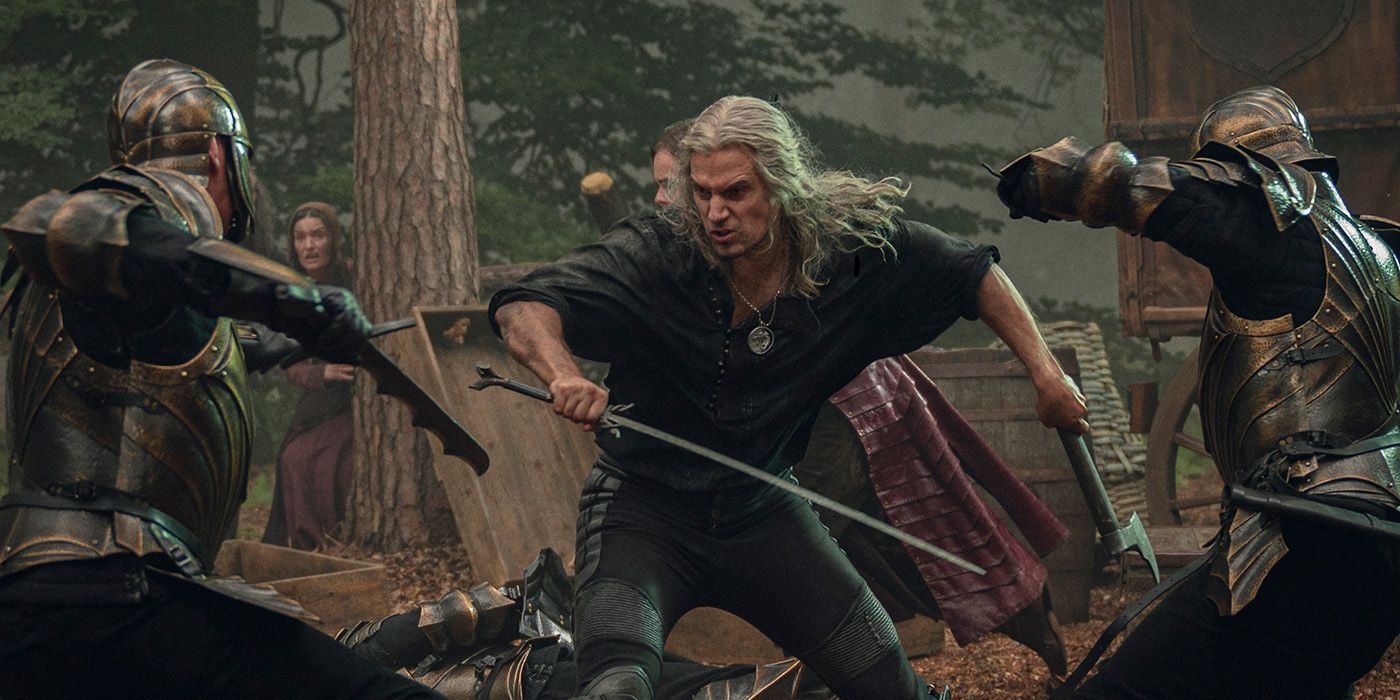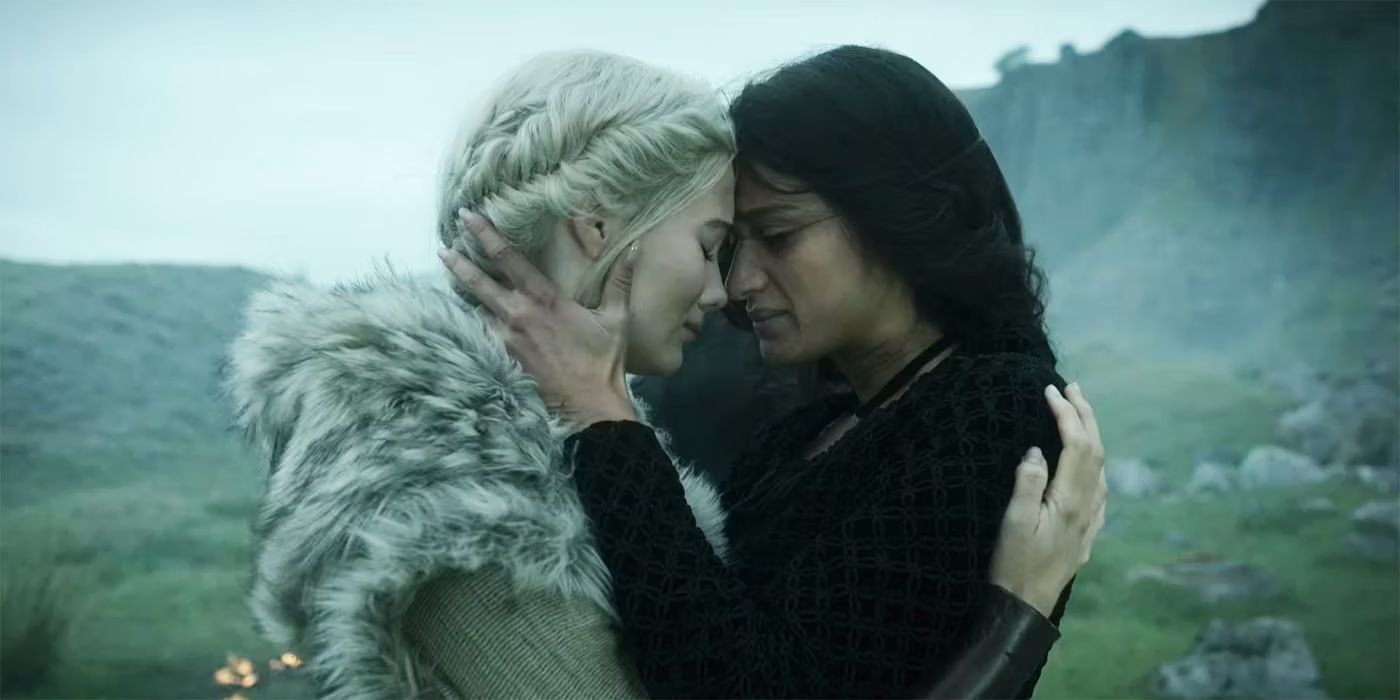Netflix has been able to use its streaming platform to create a home for series that has garnered a considerable fan following. While they’ve seen success come from their original titles in the past, not every series should have been able to earn that green light to make it past the first season. The Witcher initially felt full of promise when the streamer adapted the novel series that was later translated into deeply beloved video games. The first season of The Witcher resulted in a relatively positive response from both audiences and critics alike, but it was the second that began to show that the series was running out of momentum quickly.
you are watching: ‘The Witcher’ Should Have Ended After Season 1
Seasons 2 and 3 ultimately have struggled to maintain the quality that the first season achieved, essentially relying on Henry Cavill‘s performance as Geralt of Rivia to keep things afloat. Deviations from the book series, weak world-building, and uninteresting supporting characters are evidence that The Witcher shouldn’t have ventured farther away from a first season. The show genuinely felt like it had no sense of direction. Netflix failed to secure an invested audience willing to commit to more than one season of The Witcher, compared to dedicated fanbases found following other originals like Stranger Things. Upon completing its third season, The Witcher wasn’t just a disservice to its fans and its source material; it was greatly forgettable. If Netflix truly wanted to stand out with The Witcher, they should have stopped while they were ahead.
Netflix’s ‘The Witcher’ Moved Too Far Away From the Book Series
It’s a heavy expectation for anything inspired by other forms of media to follow them in complete faith, but The Witcher‘s decision to depart from the source material in ways that are unflattering to the series emphasizes that the show should have been canceled following the first season. Andrzej Sapkowski created an eight-book-long series that gave Netflix more than enough material to work with, yet their loose translation of the fantasy novels was not enough to ensure that the creative team had a comprehensive road map to follow. While the characters and the world are taken from the books themselves, it’s the plot that finds itself facing the most trouble. Yennefer’s (Anya Chalotra) origin story is shown in Season 1, but her cruel beginning isn’t in Sapkowski’s work; it was invented for the sake of the show and was an early sign that Netflix would take a more hands-on approach to how they wanted The Witcher to play out. Netflix spent time creating new characters for the show — such as Wilson Mbomio‘s Dara — instead of nailing down the accuracies for pre-existing characters such as Triss Merigold (Anna Shaffer), who was inserted into the short story where Geralt faces off with the Striga. While the tale itself is from The Witcher, she was never written into its original plot.
The Witcher changes details from the books even more in later seasons. Season 1 may have been the most par for the course when following Sapkowski’s novels, but Seasons 2 and 3 depict a more notable departure from them. Netflix should have ended the show after its first season if it needed to use its own imagination to bring future seasons to life. It’s understandable that some originality would eventually come into play, but the studio’s heavy-handed overhaul essentially gutted the show of what it needed. The lack of a plan for adapting the books to the screen in a way that made sense wasn’t present beyond the first season. If anything, it felt like Netflix was attempting to produce its own fantasy series that borrowed an already famous name to call itself.
‘The Witcher’ Has Relied Too Heavily on Henry Cavill
The Witcher should have ended after its first season once it knew it needed to put all of its focus on its lead. There’s nothing wrong with branding The Witcher as “that Henry Cavill Geralt show” to some extent, yet Netflix’s The Witcher‘s focus on Henry Cavill became its main selling point. Keeping Cavill at the helm of The Witcher could only take the show so far, but failed to do one key thing: redeem the quality. Netflix continued to look to Cavill to draw in viewership, but as time went on, that novelty began to wear off. One season was enough to show the depth of who Geralt was in the live-action adaptation and how far Cavill could take the character.
It was announced in late 2022 that Henry Cavill would depart from The Witcher and that the titular role would be passed on to Liam Hemsworth. Losing the show’s star — which is arguably a reason why The Witcher became so popular upon release — questions the need for The Witcher Season 4. If The Witcher stuck to being a one-off event, the show wouldn’t have found itself needing to rely on Cavill to drive sophomore seasons forward in the first place. Netflix putting all of its weight on Cavill was a telltale sign that it didn’t have an idea of how it wanted to navigate additional chapters of The Witcher, and how it might be unprepared to move on without him.
‘The Witcher’ Has Failed to Create Compelling Characters and Worlds
Though The Witcher has endured three seasons with a fourth on the way, the saga has failed to set up a compelling universe and invest time into creating characters with substance. It’s been evident that the show has struggled to create coherent subplots that prioritized supporting characters in later seasons. Ciri (Freya Allan) and Geralt’s relationship wasn’t given the same significance and there has been little dedication put into making sure Ciri could stand out as a female fantasy protagonist on her own. In the books, Geralt and Ciri form a father-daughter bond drawn together by destiny. Ciri’s journey is treated with higher importance elsewhere, and The Witcher couldn’t cut her out to be as interesting of a character in the Netflix adaptation. Other women in fantasy have been able to resonate with a fanbase, such as Arya Stark in Game of Thrones, and The Witcher could have learned from HBO’s example if it wanted to be like the HBO series. It felt like a waste of potential for how Ciri could have been elevated and obviously points out how flatly she was depicted in the series. Not knowing how to accurately portray her wounded The Witcher as a whole.
The Witcher has also had no idea what to do with Yennefer when she should have been much more prominent. Netflix’s misunderstanding of the women of The Witcher argues that there was no need to try to re-invent them for the series’ sake. Nothing was fascinating about The Witcher‘s secondary characters; they all felt synonymously written. No standout personalities or defining traits made a greater impact past their initial introductions. The ability to forget The Witcher‘s characters contributes to how forgettable the show has become overall. Joey Batey‘s Jaskier was fairly removed from his in-universe counterpart, Dandelion, and anything following the first season felt too out of place for his character development. By the time Season 3 eventually cleared up his roots, it was too late for the grand reveal to make an impact; his arc should have been well-addressed in the first season.
When thinking about the depths of an in-world universe, The Witcher did not confidently approach how it wanted to weave it into the show altogether. There was nothing genuinely exciting or intriguing about the Continent. Every location felt like a placeholder on a map with no further meaning. Frankly, it became boring. The Continent is incredibly generic when it comes to how fantasy worlds are depicted on screen, and the Netflix series did not validate that more of it should be seen in later seasons. Not knowing how to feature fictional nations in the show in a meaningful, purposeful, and memorable way contradicts the decision to make it a greater aspect of a series in the first place. The Witcher showed what it could of The Continent in the first season, though there was an inability to expound on it past that.
The Witcher was able to debut with a strong start in its first season. The want or need for any other seasons of The Witcher, though, became less warranted as there was little left for the show to do. It burned itself out too quickly and had no sense of direction when looking for where it wanted to go next. The Witcher should have ended after its first season due to how much it exhausted itself later on. A second season was already questionable – excluding interesting characters, authentic storytelling, and a unique fantasy world eliminated any justification for The Witcher to be renewed.
Source: https://dominioncinemas.net
Category: TV FEATURES












